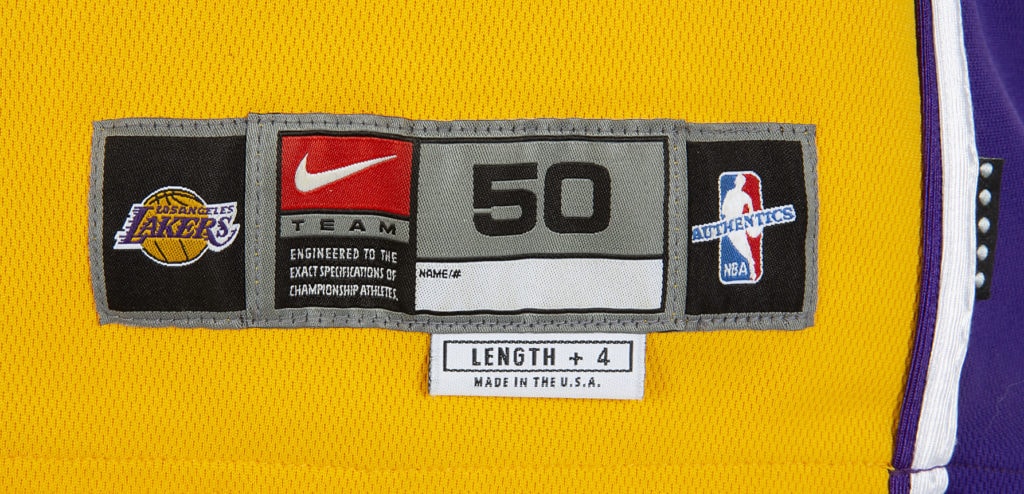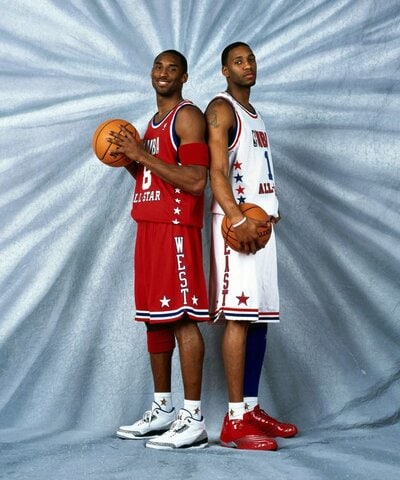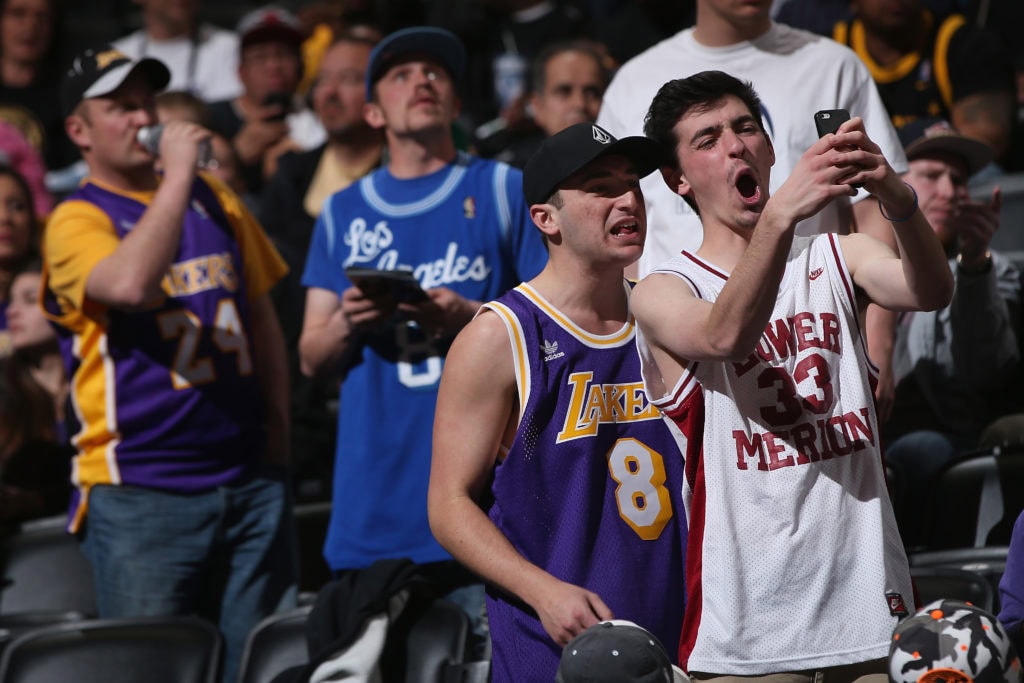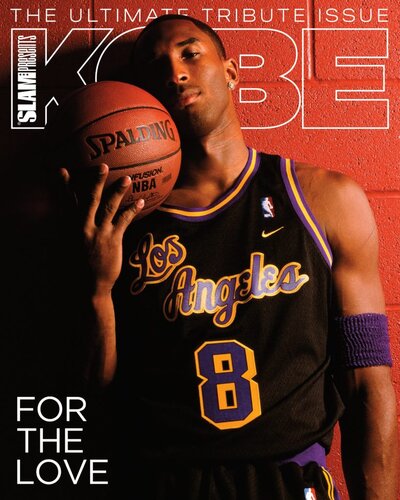As the world celebrates Mamba Day on 8/24, Boardroom dives deep into the economics and insights behind the ultimate item of Kobe Bryant fan gear.
This week, Kobe Bryant would have turned 44 years old.
Playing 20 years with the Los Angeles Lakers, a team that drafted him at the tender age of 17 and saw him win five NBA championships, make 18 All-Star Games, and win two Finals MVPs, the Black Mamba’s ties to the Purple and Gold run profoundly deep.

While already a legend prior to his tragic passing, his untimely death took his fanfare to even higher heights, connecting on another level with lovers of basketball, hard work, and fatherhood.
Because of this, a Kobe Bryant jersey in both No. 8 and No. 24 varieties has taken on new meaning with regard to fashion and fan gear.
Over the course of his 20-year playing career, retirement era, and posthumously popularity, the authorized manufacturers of NBA apparel have changed hands numerous times as have the rights to Bryant’s likeness.
All the while, fans have had to navigate increasing demand for Kobe paraphernalia amongst corporate pressure to keep the Bryant brand premium. This has resulted in a sea of fake jerseys made to fill the gap between supply and demand.
From Bryant’s rookie year arrival in 1996 to today in 2022, Boardroom breaks down the brands and business behind Kobe jerseys in the past with hopes of what fans can expect in the future.
The Playing Days
After arriving in the midst of a league-wide deal with Champion as a uniform manufacturer upon rookie debut in 1996-97, the Los Angles Lakers were officially outfitted by Nike starting in Kobe Bryant’s second season.

Joining the likes of the Chicago Bulls, the major market and historic team had their uniforms and warm-ups created with Dri-Fit fabrics and sought-after Swoosh designs.
Infamously, both Bryant (Adidas) and teammate Shaquille O’Neal (Reebok) endorsed rival brands at the time, often choosing to place a piece of black tape over the Swoosh on their shooting shirts as a result.
Through the late ’90s and into the early ’00s, Nike continued to dress the Lakers on the court while taking on the likes of the Miami Heat, Detroit Pistons, San Antonio Spurs, Boston Celtics, Washington Wizards, Toronto Raptors, Dallas Mavericks, and Portland Trailblazers.
Elsewhere in the Association, Puma produced game and practice gear for the likes of the New York Knicks and Sacramento Kings, while Starter handled teams like the Minnesota Timberwolves and Houston Rockets.
But by 2001, just months after Allen Iverson and the 76ers fell at the hands of Shaq and Kobe, the NBA signed a 10-year partnership with A.I.’s backers at Reebok, making the Vector the official outfitter of all game jerseys for the next decade.
Oddly enough, the timing was both terrible and wonderful where Kobe and Nike were concerned.

In the middle of what would become a championship three-peat and still signed by the Three Stripes, Kobe Bryant had the top-selling NBA jersey in the spring of ’01, ’02, and ’03. Nike held rights to the authentic game version in 2001 — one that retailed for a whopping $175 at the time — scored with premium fabric and embroidery.
Conversely, Champion still retained the power to produce fan-focused replicas for the first five seasons of Kobe’s career. These were screen-printed on over-the-shoulder mesh tops and came in closer to $65 retail.

Even with Reebok taking over the entire NBA jersey game as an exclusive on-court partner, Champion retained rights in those early years to produce cost-efficient replica tops while Reebok retained the rights to manufacture and sell all authentics.
Seizing upon a gap in the market, Nike introduced the Swingman jersey in partnership with the NBA as an elevated casual look amidst the growing throwback craze, starting them at $69.99 and increasing in cost over time.
From Fall 2001 through Spring 2004, Nike absolutely ate off the throwback frenzy, selling jerseys exalting Kobe, LeBron James, and countless other All-Stars at the perfect price point. Even better for the Swoosh, Kobe had forced out of his Adidas deal heading into the Fall of 2002, signing with Nike the next summer.
By Fall 2004, Reebok had enough, taking over the entire NBA from top to bottom in regards to licensed apparel, pushing out Champion and Nike while making their own Swingman styles. The Reebok reign proved short-lived, however, as Adidas acquired the competitor company in the early months of 2006, subsequently taking over the NBA as the official outfitter from Fall 2006 until Spring 2017.
This window would correspond with two more Kobe Bryant championships, as well as his retirement.
Throwback Life
By Bryant’s final season in 2015-16, he still had the third-highest-selling jersey in the league by way of his modern No. 24 Adidas tank, while also possessing one of the most popular throwbacks on the market thanks to his No. 8 tops made by Mitchell & Ness.
Fifteen months after Kobe Bryant played his final game in an Adidas uniform, Nike took over as the official outfitter of the NBA for the first time ever. Unlike their early go-rounds lacing the Lakers, the staple Swoosh logo appeared not just on Swingman styles, but firmly on the shoulder of on-court authentic jerseys.
Though Kobe was no longer actively playing, his Laker legacy and footwear partnership with Nike allowed the brand to produce Swingman styles tied to No. 8 and No. 24 in both modern and heritage styles.
Over the course of Nike’s ongoing run with the NBA, the brand released Kobe Swingman styles ranging from powder blue “MPLS” throwbacks to modern alternate editions. Occasionally, authentic Nike jerseys made with Bryant in mind would drop at retail, permitting the brand to offer Kobe tanks at adult price points of $120 and $225.
This all allowed Nike to leverage their new NBA partnership that presented the idea of City, Statement, Icon, Association, and Classic Edition jerseys with Kobe cachet.
All the while, Mitchell & Ness still possessed the rights to produce Kobe throwbacks. From archival All-Star tops to one-to-one game styles to thematic takes, the Philadelphia-born nostalgia merchant currently stocks over 30 unique Kobe jerseys. Many are exclusive to their web store while plenty of styles are also stocked at retailers. Additionally, all are authentic construction, making for price points ranging from $300 to $450.

Much like Michael Jordan, the Kobe estate’s deal with M&N only allows them to produce authentic tanks; not Swingman styles. Notably, the likes of Allen Iverson, Shaquille O’Neal, and Jason Williams are all strong sellers that allow licenses for both tiers of tanks, offering jerseys that start at $135 that can be scaled down to smaller sizes at lower prices.
Because of the break in contract between Nike and the Bryant estate 2021 — it has since been resumed and restructured, and new products await — Mitchell & Ness holds a monopoly on officially licensed Kobe jerseys available at retail. Because of the high price point associated with M&N authentics and the rabid fanfare for Bryant post passing, there is a gigantic void in the market — and fake jerseys are feeding the frenzy of demand.
If Nike decides to get back in the Kobe Bryant jersey business or the Mamba estate allows M&N to make and sell Swingman styles, there are still plenty of untapped throwbacks for both companies and the estate to capitalize upon.
What’s Next?
As Kobe Day 2022 takes place, the Black Mamba is back with Nike on official terms while still seemingly under contract with Mitchell & Ness.

All estimates suggest that the throwback purveyor will continue to produce authentic jerseys at a steady rate with no signs suggesting Swingman styles by M&N will be part of the business model. Additionally, the Philly company has been able to engineer All-Star jersey rights over the course of Kobe’s career, meaning that Adidas-manufactured designs from All-Star Games of the past could come back to market under their watch.
With 18 All-Star selections under his belt and only four jerseys currently available to celebrate such occasions, many more makeups of said exhibitions could be in the offing in the coming months and years.
Where Nike is concerned, meanwhile, is where things get interesting. In 2020, the Swoosh celebrated Mamba Day with the launch of a Black Mamba Lakers jersey with No. 8 on the front and No. 24 on the back. Limited in numbers, the jersey sold out incredibly fast, with the tanks currently trading for at least three times original retail price on StockX.
When considering the Lakers loaded past and imaginative future where the NBA x Nike jersey program stands, the possibility for future Kobe Swoosh Swingman styles is deep. This year, the franchise will return an early Minneapolis Lakers style as their Classic Edition uniforms. In the late ’10s, Nike would’ve used this as an opportunity to sell both No. 8 and No. 24 Bryant jerseys as they did with 2017-18 retro threads.
Additionally, Nike possesses the power to tell the whole Kobe story in a fashion few can. For all of Bryant’s Team USA action, the Swoosh was the official provider of his red, white, and blue tanks. Currently, M&N sells authentic 2008 Redeem Team tanks tied to Jason Kidd, Dwyane Wade, and Chris Bosh; products are notably not available for Nike athletes like Kobe and LeBron as of this time.
Perhaps Nike fills this gap with their own launch.
International play aside, Nike was behind the popular Rewind series of jerseys released at retail in the early 2000s. The novel concept took classic throwback styles and swapped the color palette for a new take on an old script. The Black/Purple-Yellow take on the 1960s cursive Lakers jersey famously covered Kobe on SLAM Magazine.

While this approach is commonly faked, Nike would conceivably be able to produce and release said style with modern fabrication.
Nuanced elements of Kobe’s story also provide opportunity. During the original Nike Swingman era amidst the throwback craze, the Swoosh released the Nike TAG (Talented and Gifted) Program, which recreated high school jerseys made famous by LeBron, Carmelo Anthony, Paul Pierce, and several other Hall of Fame-level talents.
Originally, a Lower Merion High School Bryant tank was to be sold; however, it was shelved due to the legal issues he faced in Colorado in 2003. To this day, variant takes on Kobe’s high school uniform are wildly popular.
If Nike wanted to make plans today to release the iconic prep jersey today, they almost certainly could.
While nostalgic styles from Kobe’s past provide plenty of ripe fruit to pick, it’s fair to say that the most lauded is the Black Mamba City Edition tank. Whether released with dual-digit branding or one of each nostalgic number, demand remains high as seen by aftermarket prices. The fact that the 2020 Lakers brought back the style for their spirited championship run adds another loaded layer to the story.
And who’s to say the team couldn’t revamp the Mamba Edition tanks in “Grinch” green for Christmas Day 2022?
All told, with Kobe back on board with Nike as of March 2022 and the Swoosh currently in the middle of an eight-year, $1 billion deal with the NBA, there are plenty of business reasons to make more jerseys celebrating the game’s greatest worker.
And countless fans around the world are more than ready to welcome exactly that.